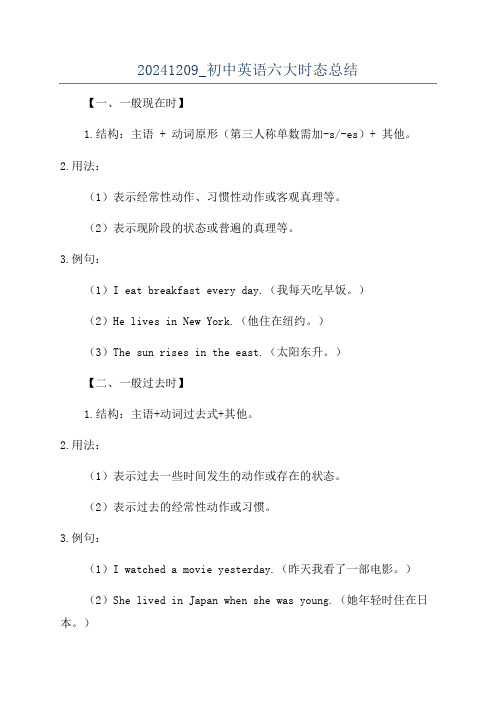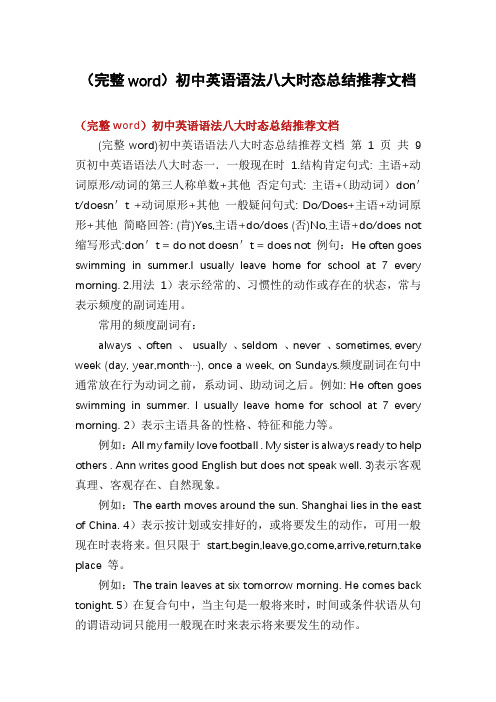(完整版)鲁教版初中英语初三英语四个时态提纲
20241209_初中英语六大时态总结

20241209_初中英语六大时态总结【一、一般现在时】1.结构:主语 + 动词原形(第三人称单数需加-s/-es)+ 其他。
2.用法:(1)表示经常性动作、习惯性动作或客观真理等。
(2)表示现阶段的状态或普遍的真理等。
3.例句:(1)I eat breakfast every day.(我每天吃早饭。
)(2)He lives in New York.(他住在纽约。
)(3)The sun rises in the east.(太阳东升。
)【二、一般过去时】1.结构:主语+动词过去式+其他。
2.用法:(1)表示过去一些时间发生的动作或存在的状态。
(2)表示过去的经常性动作或习惯。
3.例句:(1)I watched a movie yesterday.(昨天我看了一部电影。
)(2)She lived in Japan when she was young.(她年轻时住在日本。
)(3)We played soccer every Sunday.(我们每个星期天踢足球。
)【三、一般将来时】1.结构:主语 + will/shall + 动词原形 + 其他。
2.用法:(1)表示将来发生的动作或存在的状态。
(2)表示意愿、承诺或命令。
3.例句:(1)I will go to bed early tonight.(今晚我会早点上床睡觉。
)(2)She will be happy to help you.(她会乐意帮助你。
)(3)You shall finish your homework before you go out.(你要在出门前完成作业。
)【四、一般现在进行时】1.结构:主语 + am/is/are + 动词-ing形式 + 其他。
2.用法:(1)表示现在正在进行的动作。
(2)表示计划或即将发生的未来动作。
3.例句:(1)They are eating dinner now.(他们现在正在吃晚饭。
)(2)I am meeting my friends after school.(放学后我要见我的朋友。
初中英语语法时态

初中英语语法时态初中英语语法时态可以分为以下几个部分:一、一般现在时(Simple Present Tense)用法:表示经常性、频率较高或普遍真理的动作或状态。
例句:I play basketball every day.(我每天打篮球。
)二、一般过去时(Simple Past Tense)用法:表示过去某个具体的动作或状态。
例句:She watched a movie last night.(她昨晚看了一部电影。
)三、一般将来时(Simple Future Tense)用法:表示将来要发生的动作或状态。
例句:They will go to the park tomorrow.(他们明天要去公园。
)四、现在进行时(Present Continuous Tense)用法:表示现在正在进行的动作。
例句:He is studying in the library now.(他现在正在图书馆里学习。
)五、过去进行时(Past Continuous Tense)用法:表示过去某个时间点正在进行的动作。
例句:We were playing soccer at that time.(我们当时正在踢足球。
)六、将来进行时(Future Continuous Tense)用法:表示将来某个时间点正在进行的动作。
例句:I will be working at 8 o'clock tomorrow.(我明天8点将会正在工作。
)七、现在完成时(Present Perfect Tense)用法:表示过去发生的动作对现在造成的影响。
例句:She has finished her homework.(她已经完成了她的作业。
)八、过去完成时(Past Perfect Tense)用法:表示过去某个时间点之前已经完成的动作。
例句:I had already eaten when he arrived.(当他到达时,我已经吃过了。
初中英语语法时态总结

初中英语语法时态总结初中英语语法时态总结初中英语语法共有16种时态,那么大家对英语语法时态的知识了解多少呢?以下是小编为大家整理的初中英语语法时态总结相关内容,仅供参考,希望能够帮助大家。
一、一般时态1、一般现在时(1)一般现在时表示没有时限的持久存在的动作或状态或现阶段反复发生的动作或状态,常和副词usually,often,always sometimes,regularly,near,occasionally,every year, every week等连用。
例如:1)The moon moves round the earth..2)Mr. Smith travels to work by bus every day.(2)在由after,until,before,once,when,even if,in case,as long as,as soon as,the moment以及if,unless等引导的时间状语从句或条件状语从句中,通常用一般现在时代替将来时。
例如:1)I will tell him the news as soon as I see him.2)I will not go to countryside if it rains tomorrow.(3)某些表示起始的动词,可用一般现在时表示按规定、计划或安排要发生的动作,这类动词有:be,go,come,start,depart,arrive,begin,leave等。
例如:1)The plane leaves at three sharp.2)The new teachers arrive tomorrow.(4)在由why,what,where,whoever,who,that,as等引导的从句中,也常用一般现在时代替将来时。
例如:1)Free tickets will be given to whoever comes first.2)You’ll probably be in the same train as I am tomorrow.2.一般过去时(1)表示过去某一特定时间所发生的、可完成的动作或状态,常与表示确切过去时间的词、短语或从句连用。
初中英语动词时态归纳总结

初中英语动词时态归纳总结动词时态是英语学习中一个至关重要的内容,广大初中学生在实际运用时,往往对时态总是倍感棘手,为此,以下是店铺分享给大家的初中英语动词时态归纳,希望可以帮到你!初中英语动词时态归纳一般现在时的用法1) 经常性或习惯性的动作,常与表示频腮度的时间状语连用。
时间状语: every…, sometimes, at…, on Sunday。
例如:I leave home for school at 7 every morning. 每天早上我七点离开家。
2) 客观真理,客观存在,科学事实。
例如:The earth moves around the sun. 地球绕太阳转动。
Shanghai lies in the east of China. 上海位于中国东部。
3) 表示格言或警句。
例如:Pride goes before a fall. 骄者必败。
注意:此用法如果出现在宾语从句中,即使主句是过去时,从句谓语也要用一般现在时。
例:Columbus proved that the earth is round. 哥伦布证实了地球是圆的。
4) 现在时刻的状态、能力、性格、个性。
例如:I don't want so much. 我不要那么多。
Ann writes good English but does not speak well. 安英语写得不错,讲的可不行。
比较:Now I put the sugar in the cup. 把糖放入杯子。
I am doing my homework now. 我正在做功课。
第一句用一般现在时,用于操作演示或指导说明的示范性动作,表示言行的瞬间动作。
第二句中的now是进行时的标志,表示正在进行的动作的客观状况,所以后句用一般现在时。
一般过去时的用法1)在确定的过去时间里所发生的动作或存在的状态。
例如:时间状语有:yesterday, last week, an hour ago, the other day, in 1982等。
(完整word)初中英语语法八大时态总结推荐文档

(完整word)初中英语语法八大时态总结推荐文档(完整word)初中英语语法八大时态总结推荐文档(完整word)初中英语语法八大时态总结推荐文档第1 页共9 页初中英语语法八大时态一.一般现在时 1.结构肯定句式: 主语+动词原形/动词的第三人称单数+其他否定句式: 主语+(助动词)don't/doesn't +动词原形+其他一般疑问句式: Do/Does+主语+动词原形+其他简略回答: (肯)Yes,主语+do/does (否)No,主语+do/does not 缩写形式:don't = do not doesn't = does not 例句:He often goes swimming in summer.I usually leave home for school at 7 every morning. 2.用法1)表示经常的、习惯性的动作或存在的状态,常与表示频度的副词连用。
常用的频度副词有:always 、often 、usually 、seldom 、never 、sometimes, every week (day, year,month…), once a week, on Sundays.频度副词在句中通常放在行为动词之前,系动词、助动词之后。
例如: He often goes swimming in summer. I usually leave home for school at 7 every morning. 2)表示主语具备的性格、特征和能力等。
例如:All my family love football . My sister is always ready to help others . Ann writes good English but does not speak well. 3)表示客观真理、客观存在、自然现象。
例如:The earth moves around the sun. Shanghai lies in the east of China. 4)表示按计划或安排好的,或将要发生的动作,可用一般现在时表将来。
初三英语复习提纲

初三英语复习提纲初三是每个学生人生中至关重要的一个阶段,初中学习的知识点决定了学生们能否顺利进入高中,进行更加深入的学习。
其中,英语作为一门重要的科目,对于学生的成长也有着至关重要的作用。
为了帮助初三学生更好地备考英语,我们为大家整理出一份初三英语复习提纲,希望能够帮助到大家。
一、语法1.时态时态是英语语法中最重要的一部分,同时也是初三英语复习中需要特别关注的知识点。
常见的英语时态包括一般现在时、一般过去时、一般将来时、进行时、完成时和过去将来时等,其中以一般现在时和一般过去时使用最为广泛。
我们需要熟练掌握各个时态的基本用法,并且在语言表达中灵活运用。
2.语态英语语态包括主动语态和被动语态,其中被动语态在英语表达中使用较为普遍。
我们需要对各种被动语态的构成方式和应用场景了解,同时要能够正确的转换主动语态和被动语态。
3.从句从句是指在复合句中充当主语、宾语、定语或状语的句子。
初三英语复习中,我们需要掌握各种从句的种类和使用方法,如定语从句、状语从句、宾语从句等。
4.形容词和副词形容词和副词是英语语法中的重要组成部分。
我们需要学习各种形容词和副词的比较级和最高级,并且需要在应用中掌握适当的用法。
5.虚拟语气虚拟语气是英语语法中的难点之一,需要在学习中特别关注。
我们需要熟悉虚拟语气的使用规则,理解其中的逻辑关系,并能够在语言表达中准确运用。
二、词汇词汇是英语学习的基础,初三英语复习中也需要我们掌握大量的词汇。
我们需要做到以下几点:1.熟练掌握基础单词和常用短语。
2.积累常用词组和惯用语,并学会在语言表达中运用。
3.多参加英语交流和讨论,为自己的词汇积累提供机会。
三、阅读理解阅读理解是英语考试中占比最大的一项,也是考察学生阅读能力和语言表达能力的重要手段。
在初三英语复习中,我们需要掌握以下几点:1.培养良好的阅读习惯,提高自己的阅读速度和准确率。
2.掌握各种阅读理解技巧,如猜测词义、寻找主题句、理解上下文等。
英语四大时态教案模板初中

#### 教学目标1. 让学生理解并掌握英语的四大时态:一般现在时、现在进行时、一般过去时和一般将来时。
2. 通过练习,使学生能够正确运用这些时态进行日常对话和写作。
3. 培养学生辨别不同时态的能力,提高他们的英语语言运用能力。
#### 教学重难点- 重点:四大时态的基本构成、用法及常见时间状语。
- 难点:不同时态之间的区别及在具体语境中的运用。
#### 教学准备- 多媒体课件- 练习题- 实物或图片辅助教学#### 教学过程##### 第一课时:一般现在时Step 1: 导入- 通过展示一些日常生活中的图片或视频,引导学生用英语描述,引出一般现在时。
Step 2: 语法讲解- 介绍一般现在时的概念和基本结构,包括肯定句、否定句和疑问句的构成。
- 讲解一般现在时的用法,如表示经常性、习惯性动作或状态。
Step 3: 练习- 通过多媒体课件进行语法填空练习,巩固所学知识。
- 分组讨论,让学生用一般现在时描述自己的日常生活。
Step 4: 小结- 总结一般现在时的用法,强调其在描述日常习惯和一般事实中的应用。
##### 第二课时:现在进行时Step 1: 复习- 复习上一节课学过的一般现在时,引入现在进行时。
Step 2: 语法讲解- 介绍现在进行时的概念和基本结构,包括肯定句、否定句和疑问句的构成。
- 讲解现在进行时的用法,如表示正在进行的动作或状态。
Step 3: 练习- 进行现在进行时的语法填空练习。
- 角色扮演,让学生用现在进行时描述正在进行的动作。
Step 4: 小结- 总结现在进行时的用法,强调其在描述正在进行的动作或事件中的应用。
##### 第三课时:一般过去时Step 1: 复习- 复习前两节课学过的一般现在时和现在进行时。
Step 2: 语法讲解- 介绍一般过去时的概念和基本结构,包括肯定句、否定句和疑问句的构成。
- 讲解一般过去时的用法,如表示过去某个时间发生的动作或状态。
Step 3: 练习- 进行一般过去时的语法填空练习。
鲁教版初中英语54学制时态学习

复习现在进行时态【学习目标】1.掌握现在进行时的定义及时间状语2.熟练掌握现在进行时的结构及运用3.熟练掌握现在分词的结构及运用【课前预习】一.定义:二.时间: (现在) (看) (听)三.结构: 主语+be( )+动词的()请写出动词现在分词的构成并举例: (每条至少3个)1. 归纳2. 归纳3. 归纳注:lie变现在分词要()【合作探究】一、现在进行时态的否定,疑问形式及其回答.因为现在进行时态有Be动词,所以变否定就给Be动词加-not.变疑问就把Be 动词提到句首.回答仍用Be动词.现在进行时是由be(am/is/are)+动词-ing形式构成的。
1肯定式结构:主语+be(am/is/are)+动词-ing形式+其他.例句:例句:He is playing basketball now.2否定式结构:主语+be(am/is/are)+not+动词-ing形式+其他.例句:He isn’t playing basketball now.3一般疑问句式结构:Be(am/is/are)+主语+动词-ing形式+其他?例句:Is he playing basketball now? Yes, he is./No,he isn’t.4特殊疑问句式结构:疑问词+be(am/is/are)+主语+其他?例句:He is playing basketball now.What is he playing now?练习:1)It_ _(rain) now.2)Look! They__ _(play) basketball on the playground.3)Listen!Who___ (sing) an English song?4)My parents_ __(watch) TV now.5)"What are you doing?" "I__ _(call) to my mother."6)We__ _(get) ready for the exam these days.7)I__ _(look) for my bag now.8)listen! Someone__ _(knock) at the door.9)We__ _(have) an important meeting now.10)These students ___ _(see) a new film for children in the hall now.一.用所给动词的正确形式填空.1. What are you _________(do) now? I ___________(eat) bread.2. It’s nine o’clock. My father_______________(work) in the office.3. Look! the boy____________(put) the rubbish into the bin.4 ……________he________(clean) the classroom?……N o, he isn’t. He____________(play).5. Where is Mak? He___________(run) on the grass.6. ……Listen, who________(sing) in the music room?……Oh, Mary__________(sing) there.7.I___(listen) to the radio now.8.It's 8 o'clock. We____(have) a class.二.句型转换.1.They clean the classroom every day.(用now改为进行时态)They_ __ _ __ the classroom__ _.2.She is standing in front of the door.(改为否定句)She_ __ __ _ in front of the door.3.The birds are singing in the tree.(就划线部分提问)__ _ _ __the birds _ __ in the tree?4.You are doing your homework.(用"I"作主语改写句子)_ __ __ _ doing _ __ homework.5.They are helping the old woman.(改成一般疑问句)__ they _ __ the old woman?6.They are listening to music,too.(改为否定句)They ___ ___ to music,___.7.He isn't wayching TV at the moment.(改为肯定句)He___ ___ TV at the moment.8.I am cleaning the house with Jim.(划线提问)9.Tom is singing.(划线提问)10.Kate is putting on her new skirt.(划线提问)11.She is sitting near the window. (划线提问)三、把下列句子变为进行时态:1.We mend a clock.2.I look at the blackboard.3.We drink tea.4.He and I do our homework.5.You make a kite for me.复习学案:一般现在时态定义:一般现在时表示现在经常反复发生的动作、存在的状态或习惯性的动作的时态。
- 1、下载文档前请自行甄别文档内容的完整性,平台不提供额外的编辑、内容补充、找答案等附加服务。
- 2、"仅部分预览"的文档,不可在线预览部分如存在完整性等问题,可反馈申请退款(可完整预览的文档不适用该条件!)。
- 3、如文档侵犯您的权益,请联系客服反馈,我们会尽快为您处理(人工客服工作时间:9:00-18:30)。
初三英语时态复习提纲一般现在时1 .概念:经常、反复发生的动作或行为某种状况.2 .时间状语:always, usually, often, sometimes, every week 〔day,year,month …〕, once aweek, on Sundays,3 .根本结构:动词原形或者是第三人称单数〔如主语为第三人称单数,动词上要改为第三人称单数形式〕4 .否认形式:1〕有be 动词的为am/is/are+not;We are students.改为We aren't students2〕此时态的谓语动词假设为行为动词,那么在其前加don't,People usually go to work. 改为People don t usually go to work.3〕如主语为第三人称单数,那么用doesn't,同时复原行为动词.She likes to eat fruit.改为She doesn't like to eat fruit.4〕有情态动词的在情态动词后加上notThe doctor can help you. 改为The doctor can't help you.5 . 一般疑问句:1〕有be的把be动词放于句首;He is always at home.. 改为Js healways at home.?肯定答复:Yes, he is.否认答复:No, he isn't.2〕句子中有动词原形的用助动词do提问,We sometimes watch TV. 改为Do you sometimes watch TV?肯定答复:Yes, we do.否认答复:No, we don'tt.3〕动词为第三人称单数,那么用does,同时,复原行为动词.The girl speaks English everyday. 改为Does the girl speak English everyday肯定答复:Yes, she does.否认答复:No, she doesn't.4〕有情态动词的把情态动词提到句首I can swim. 改为Can you swim?肯定答复:Yes, I can.否认答复:No, I can't.6 . 一般现在时在句中的意义:〔1〕表示经常性的动作或状态表示经常性动作或状态时,常与often,always,usually,sometimes,every day等时间状语连用.如:The shop opens at nine every day.这家商店每天九点开门.It often snows here. 这JL经常下雪.〔2〕表示客观存在或普遍真理Light goes faster than sound.光速比声速快.Food easily goes bad in hot weather.天气热时食物容易坏.7.练习1) He usually(take) bus to school.2) . We( be not ) busy now.3) The teacher often( tell ) us to study hard.4) They(walk) to school once a week.现在进行时1 .概念:表示现阶段或说话时正在进行的动作及行为.2 . 时间状语:now, at this time, Look !. listen!3 .根本结构:be+doing doing是现在分词现在分词的结构:1) 在动词后直接力口ing go - -- going eat----eating wait----waiting2) 去e 力口ing write ----writing ride----riding3)双写加ing (以重读闭音节结尾,末尾只有一个辅音字母,双写这个辅音字母)swim----swimming drop——dropping begin——beginning4 .否认形式:be+not+doing.eg. I am not watching TV. 我不在看电视.He isn 't doing homework.他不在做作业.They aren't eating lunch.他们不在吃午饭.5 . 一■般疑问句:把be动词放于句首.Is he watching TV? 肯定答复:Yes, he is.否认答复:No, he isn't.6 .现在进行时在句中的意义(1)进行时表示说话时或现阶段正在进行的动作表示现阶段正在进行的动作,通常用表示现阶段的时间状语, 如:today,this week,this month,this year,this term,now 等.如:He is writing a novel now. 他目前正在写——部小说.(2)进行时表示按方案或已安排好要做的事这——用法只适用于某些动词,如:go,come,leave,start,arrive,return,spend,sail,meet,fly 等.如:The guest is leaving by train tonight. 客人今晚坐火车走.(3)补充说明在不少情况下,表示正在进行的动作的汉语句子,并没有“正在〞这样的字眼,但在译为英语时必须用进行时态.如:It's rainingheavily.下大雨了.How is everything going? 事情进展如何?7 .练习1) I(do) chores now.2) Listen! she3) Look! The boys(swim )4) ----Where is your father?----He( wash) the car. 般过去时1 .概念:过去某个时间里发生的动作或状态;过去习惯性、经常性的动作、行为.2 . 时 间 状 语: ago, yesterday, the day before yesterday, last week,last(year,night,month …), in 1989, just now, at the age of 5, one day, 10ng 10ng ago,3 .根本结构:1)be 动词改为 was 或were ; 2)行为动词的过去式 过去式的构成:1 )在动词后直接加ed 清辅音后读成/ t /浊辅音和元音后读成/ d / clean---cleaned / d /ask ——asked / t /2)以e 结尾的动词直接加 -d, dance---danced3)辅音字母加 y 结尾的,改 y 为i 加ed, study-studied4)以重读闭音节结尾,末尾只有一个辅音字母,双写这个辅音字母加-ed 、 e.g.skip-skipped 〔英语26个字母中,除了 a, e, i, o, u ?即aoeiu?这几个元音字母外,其他都是辅 音字母) 4 .否认形式:was/were+not;在行为动词前加 didn't,同时复原行为动词. eg. I wasn't at home last night. The books werent on the deskThe teacher worked late at night. 改为 The teacher didn't work late at night.He did his homework last Snuday. 改为 He didn't do his homewprk last Sunday.I knew you 改为 I didn't know you.5 . 一般疑问句:was 或were 放于句首;用助动词 did 提问,同时复原行为动词.1) The books were on the desk? 改为 Were the books on the desk? 肯定答复:Yes, they were.否认答复:No, they weren't. 2) The teacher worked late at night. 改为 Did the teacher work late at night.? 肯定答复:Yes,he did. 否认答复:No, he didn't. 6 . 一般过去时在句子中的意义:(1] 一般过去时表示过去的动作或状态(2] 一般过去时通常与表示过去的时间状语连用.与一般过去时连用的时间状语有: yesterday,last night(week,year,month,Sunday),then,at that time,at that moment,just now,a few days(weeks,months,years) ago 等.例句: Lucy turned off all the lights before she went out.出门前露茜关了所有的灯.(2)有时一般过去时的时间状语或是在上下文、或是暗含于句中我正在做家务. 听!她正在弹钢琴. 看!男孩子们正在游泳. 你爸爸在哪儿啊?他正在洗车.(play) the piano.Who was that?那人是谁?I saw Ker in town.我在城里看见了克尔.(3) 一般过去时在时间和条件状语从句中表示过去将来的动作或状态.Hans said he would let us know if he got any news. 汉斯说要是得到消息就告诉我们.7.练习1) He(go) to the zoo yesterday.2) The baby(try) to take the toy just now.3) They(drop) the books ten minutes ago.4) What he(do) last night?一般将来时1 .概念:表示将要发生的动作或存在的状态及打算、方案或准备做某事.2 . 时间状语:tomorrow, next day(week,month,year ), the day after tomorrow, soon , in a few minutes,in a week (in+ 一段时间) in the future , How soon in 21003 .根本结构:主语+am/is/are+going to + do; will/shall + do.4 . 否认形式:am/is/are not going to do ; will/shall not do.5 . 一股疑问句:be放于句首;will/shall提到句首.6 .例句:1) 肯定句:They are going to have lunch with us tomorrow 否认句:They are not going to havelunch with us tomorrow 一般疑问句:Are they going to have lunch with us tomorrow?肯定答复:Yes, they are. 否认答复:No, they arent特殊疑问句;When are they going to have lunch with us?2) 肯定句:They will have lunch with us tomorrow否认句:They will not have lunch with us tomorrow 一般疑问句:Will they have lunch with us tomorrow?肯定答复:Yes, they will. 否认答复:No, they won't特殊疑问句;When will they have lunch with us?6. 一般将来时在句子中的意义:(1)根本用法一般将来时用于真实条件句和时间状语从句的主句中表示将来的情况. 主将■从现如:I'll tell you as soon as he comes. 他一来我就告诉你.(2) be going to + 动词原形这一结构表示打算或准备好要做的事或有迹象说明要发生的天气变化等情况.如:What are you going to do during the summer holiday? 你暑彳民打算做什么?The train is going to arrive. 火车就要到了.(3)现在进行时( be +现在分词)有些动词的现在进行时可以表示将要发生的动作, 表示按方案或安排即将发生的事.这类动词有:go,come,leave,start,arrive,return,spend,sail,meet,fly 等.如:Annie is coming to supper this evening. 安妮今晚要来吃饭.7.练习1. He _________ (help) soon2. the doctor ________ (come) in a month.3. How soon _____ you _____ (stay) here?4. they _______ (not go) to the zoo if it _________ (rain) next Sunday.一用动词的适当形式填空:1. _______ May ______ (come) here every day?2. ____ your parents often _______ (give) you money?3. He (want) to go to Beijing next Friday.4. Jim _ (brush) his teeth at 7.00 in the morning.5. Tom and I usually (help) our teachers.6. His sister (like) singing songs.7. The cleaner (sweep) the street every morning.8. My mother _______ (not do) housework yesterday.9. My dad _______ (make) a toy car now10. They (take) exercises for 2 hours every day.11. Tom and Mary ___ (come) to China last month.12. Mike _________ (not go) to bed until 12 o'clock last night.13. Mary __ (read) English yesterday morning.14. Tom ___ (begin) to learn Chinese last year.15. There ____ a telephone call for you just now. (be)16. There (be) a football match on TV torrow,.二根据需要填写:1. Mother ______ me a nice present on my next birthday.A. will givesB. will giveC. givesD. give2. My grandpa _______ at home the day after tomorrow.A. will stayB. wills stayC. will staysD. is staying3. He _______ in three days.A. coming backB. came backC. will come backD. is going to coming back4. Look! The children _________ ( play) football in the park.5. The day before yeaterday they _______ a volleyball match.A. will watchB. watchesC. is watchingD. watched6. They ______ an English evening last Sunday.A. did haveB. are going to haveC. will havingD. had7. ______ you _______ free next Sunday?A. Will; areB. Will; beC. Do; beD. Are; be8. _____ we _____ (go) to the zoo tomorrow?9. I ________ a teacher in the future.A. will, beB. is, beC. is, beingD. will, is10. My mother ________ (get) up early every day.11. He _______ (be) born in 1982.12. My mother ___ m e a pencil tonight.A. givesB. givingC. will give13. Where _______ you _________ (go) tomorrow?I ___________ (see) my uncle.14. My grandpa and grandma _______ to see us in two days.A. will comingB. will comeC. is comingD. are coming15. She ______ TV this evening.A. wills watchB. will watchingC. is watchingD. will watch16. Look! Some boys ___ (have) a football game.17. Where is your mother? He _______ (clean) the room.18. The men __________ (work) near the house now.19. Bill _______ (stay) at home every Sunday20. ____ they ______ (speak) Japanese? Yes, they do.21. --- Who sings best in your class?--- Jenny ______ .A. doB. didC. doesD. has done22. Mr. Lu Xun died in 1936. He _____ a lot of famous novels.A. wroteB. was writingC. has writtenD. would write23. 他们正在清扫教室.24. Tom 每天做作业吗?不,周末他看电视.25. 我哥哥一回到威海就会给我打26. 我将来会帮助更多的人解决困难.27. 你妈妈多久会回来呢?28. 上个周Lucy 写了一封信29. 前天,我在街上看见了一个同学30. 两个周以后,我会写完这本书.。
